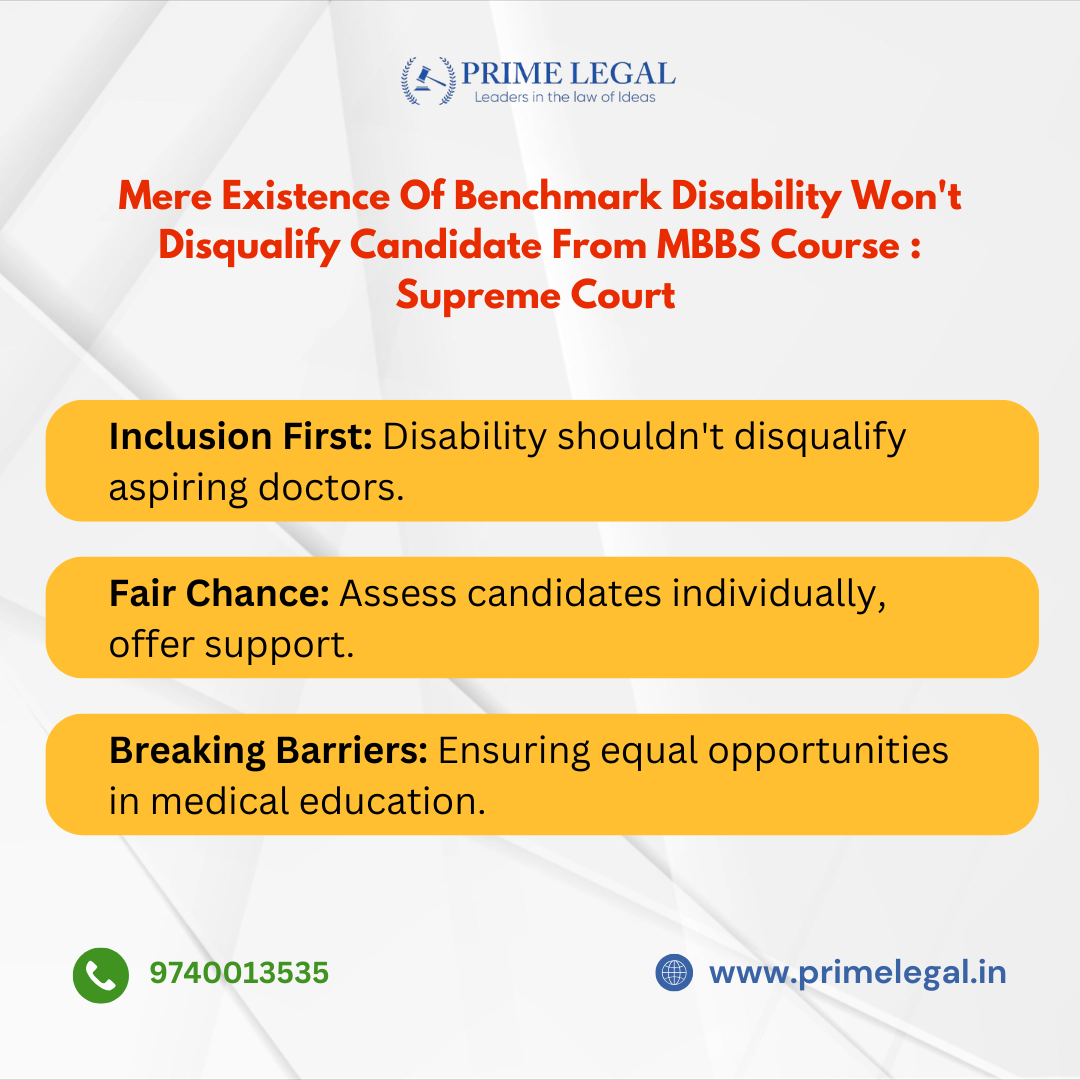INTRODUCTION
The Supreme Court of India recently issued a landmark judgment addressing the rights of persons with disabilities in relation to medical education. In this ruling, the Court clarified that the mere existence of a benchmark disability should not automatically disqualify a candidate from pursuing an MBBS course. This judgment reinforces the principles of inclusion and equal opportunity for disabled individuals, particularly in the field of professional education. The decision holds immense significance as it shifts the focus from disability as a disqualifying factor to an evaluation of whether the candidate is capable of performing essential medical tasks, ensuring that medical education remains inclusive.
BACKGROUND
The case revolved around a medical aspirant who was denied admission to an MBBS course on the grounds of having a benchmark disability. A benchmark disability, as defined under the Rights of Persons with Disabilities Act, 2016, refers to a disability of 40% or more, making the individual eligible for certain benefits and reservations. However, in this instance, the medical institution disqualified the candidate, citing concerns over their ability to handle the rigors of medical education and practice due to their disability.
The student challenged the decision, arguing that the rejection was discriminatory and in violation of their rights under the Rights of Persons with Disabilities Act, 2016. The case eventually reached the Supreme Court, where the central issue was whether the mere presence of a benchmark disability should automatically exclude someone from pursuing a medical degree.
The issue also raised broader concerns about how educational institutions assess the fitness of disabled individuals for professional courses and whether these assessments align with the principles of inclusivity and reasonable accommodation mandated by law.
KEY ASPECTS
The Supreme Court’s ruling in this case is a significant step toward ensuring the rights of persons with disabilities in the realm of education, especially medical education. The Court focused on several key aspects to arrive at its decision:
Right to Equal Opportunity
The Court underscored that denying admission to a candidate based solely on their disability is against the spirit of equal opportunity and inclusion. The Rights of Persons with Disabilities Act, 2016, guarantees that individuals with disabilities should have access to educational and professional opportunities on par with others. The Court highlighted that institutions cannot categorically reject disabled candidates without assessing their ability to meet the specific requirements of the course.
Reasonable Accommodation
The concept of reasonable accommodation was a central element in the judgment. This principle requires that institutions make necessary modifications or provide support to disabled individuals to ensure that they are able to participate fully in education or employment. The Court stated that educational institutions, particularly in the field of medicine, must provide reasonable accommodation to candidates with disabilities, ensuring that they have a fair chance to succeed.
Fitness to Perform Essential Functions
The Court emphasized that while certain disabilities may present challenges in a medical profession, candidates should be evaluated on whether they can perform the essential functions required by the medical profession, either with or without reasonable accommodation. The mere existence of a benchmark disability should not automatically be seen as a barrier to admission. Instead, a more nuanced, case-by-case assessment should be carried out to determine if the candidate can successfully complete the course and practice as a doctor.
CONCLUSION
The Supreme Court’s judgment serves as a significant precedent in ensuring that individuals with disabilities are not denied educational opportunities based on assumptions about their abilities. It reinforces the idea that disabilities should not be treated as automatic disqualifications in professional education, including highly demanding fields like medicine. The ruling mandates that institutions must evaluate candidates on a case-by-case basis, considering their ability to meet essential functions with reasonable accommodations.
This decision is a victory for disability rights in India and paves the way for greater inclusion in the field of medical education. It sends a strong message that society must move beyond prejudiced views of disability and embrace the potential of all individuals to contribute meaningfully, provided they are given the opportunity and support to do so.
“PRIME LEGAL is a full-service law firm that has won a National Award and has more than 20 years of experience in an array of sectors and practice areas. Prime legal falls into the category of best law firm, best lawyer, best family lawyer, best divorce lawyer, best divorce law firm, best criminal lawyer, best criminal law firm, best consumer lawyer, best civil lawyer.”
WRITTEN BY: ABHISHEK AIYAPPA.


